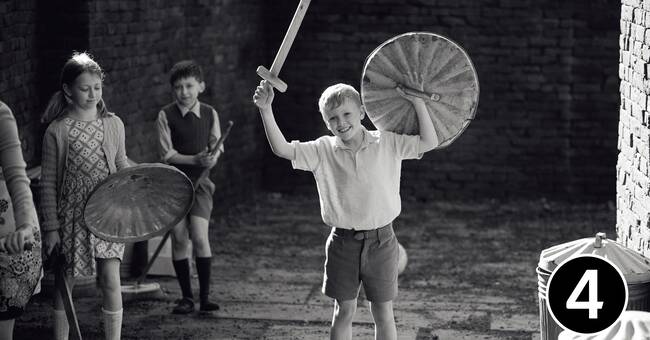The kids play
on the street in misty sunlight, hard but heartily watched by the neighborhood adults.
Suddenly, the idyllic scene explodes into violence and chaos.
The war comes and crushes the young Buddy's world.
It is family and childhood versus evil, sudden death - in an eternal conflict.
The film in a bursting nutshell.
The director and trained actor Kenneth Branagh's ability to raise an eyebrow at the right laconic moment, the dry humor - everything speaks British cultural upper class with a big island. So it came as a surprise that this avid Shakespeare interpreter was born and raised in a working class home in what the English with the usual fingertip feeling for euphemisms called "The troubles": that is, the civil war in Northern Ireland that lasted for much of the 20th century.
But that was it
and this is what it looked like.
Approximately.
It is the late 60's when Branagh's alter ego Buddy lives with his family in an area in the title city that has been relatively spared from the conflict.
Here Catholics and Protestants live peacefully side by side, but soon the war hits a wedge here too.
Branagh's memories are in handsome black and white, with a short depth of field, which allows us to concentrate on people more than the big picture, which is also a way to be true to the child's perspective.
Buddy absorbs everything that the adults do and say but does not get the right side of "who is good and who is evil".
We live in his confusion.
The only time the
film strip gets color is when Buddy looks at film and theater - a nice picture of the life-giving power of culture.
Equally supportive and vital is grandfather, played by Ciaran Hinds (who can now also be seen in the eminent Irish mafia series Kin) whose participation is a quality mark in itself.
This also applies to Judi Dench, who makes a grandmother.
In their hands, Buddy is safe, just like us.
Branagh's script, like Buddy's steadfast father, does not take a stand.
Instead, he points to the divisive power of religion, or perhaps rather of the church, which keeps people on the carpet and causes them to attack others.
And he does it with humor:
"I have nothing against Catholicism but it is a religion that is intimidating," someone says.
Cut to a Protestant priest standing in the pulpit and frightening the congregation into obedience: "Protestants, you are sinners who are going to die."
He also shows that it is basically a class conflict rather than a religious one, and that those who ruled and fought in many cases were just gangsters inadequately camouflaged as religious activists.
"The troubles" has
given rise to a whole horde of extremely worthwhile films.
Politics is usually at the center, as in scorching Hunger, exciting 71 'and intense Bloody Sunday.
Kenneth Branagh's contribution draws more in the slightly sentimental and nostalgic direction, which one might think is a bit devastating, given how much suffering the conflict has caused over the years, but he still escapes thanks to the fact that he so consistently maintains the child's point of view.
And all the flowing music signed by Van Morrison does not make matters worse.

